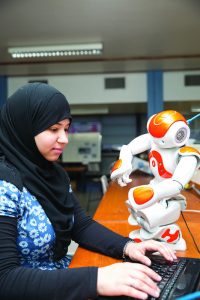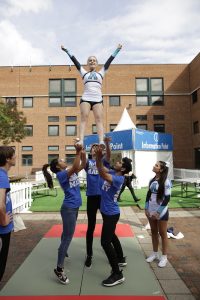Guide to Writing a Personal Statement
By Harry Yuen
What is a Personal Statement?
At some point when applying to University, you will have to write a 4000 character personal statement. Many students see this as a daunting task. However, this is not the case! A personal statement is an opportunity for you to showcase your personal interests, skills and knowledge, as well as to provide evidence outside of grades to highlight your strengths as an applicant. In this blog, we will discuss some key components to writing a strong personal statement. So, let’s dive in!
Brainstorming
 Before you start, you might find it useful to first grab a paper and pen and make a list of experiences you think would make you look like a strong applicant. Write down all the experiences you could possibly include to start with, then narrow these down to the most relevant and most recent, to include in your statement. Many students struggle with this; they worry they lack experience or are often unsure of what to include. But truthfully, what makes a good personal statement is not so much how many experiences you can include, but how you can make them relevant; why do you believe you’ll make you a successful student? Nonetheless, experiences act as the backbone of your personal statement. After all, anyone can say they’re passionate about a subject, or they think they’ll be a great candidate, but you need examples to prove it!
Before you start, you might find it useful to first grab a paper and pen and make a list of experiences you think would make you look like a strong applicant. Write down all the experiences you could possibly include to start with, then narrow these down to the most relevant and most recent, to include in your statement. Many students struggle with this; they worry they lack experience or are often unsure of what to include. But truthfully, what makes a good personal statement is not so much how many experiences you can include, but how you can make them relevant; why do you believe you’ll make you a successful student? Nonetheless, experiences act as the backbone of your personal statement. After all, anyone can say they’re passionate about a subject, or they think they’ll be a great candidate, but you need examples to prove it!
Here are some common examples: 
Academic experience
- School Projects
- Relevant coursework
Work experience
- Internships
- Voluntary work
- Part-time job (e.g., Barista, Sales Assistant)

Hobbies and interests
- Further reading beyond your curriculum
- Personal projects (Youtube Channels or Blogs)
Extracurricular activities
- Sports team
- Chess club
- Debate team
- Music Club



Hopefully these will give you a general idea as to what to include. Once you’ve made a list, narrow down your experiences to those that best highlight your strengths and suitability for your chosen course, and those that are most recent. You’ll want to include examples that demonstrate your skills, knowledge, interests and motivation.
Writing the Opening Paragraph
Once you’ve written down some ideas, you can start writing your opening paragraph. This is your chance to explain why you want to study this degree. What is it about the subject that excites you? Express your enthusiasm towards the subject and explain your motivations. An example could be:
“Personally, the value of science lies in the accumulation of knowledge, from the small nuances within microorganisms to our widespread knowledge of the universe. But more importantly, the sheer notion of just how little we know, this is what excites and drives me to learn.”
You might also want to include what you hope to gain from the course and what you would like to achieve in the future. For example:
“Throughout the course, not only do I wish to expand, heighten and deepen my knowledge for Biomedical Science but I hope to gain true insight into the research world; predominantly towards genetics and microbiology, two areas in which I hold the most interest towards.”
A great opening to your personal statement should include a specific moment in your life that really made you feel inspired to study this subject. It could be something you recently read, or something you recently experienced. Try to avoid cliches, and instead tell the reader an interesting storyline that was personal to you; this will help kick off your personal statement in an engaging way. An example could be:
“I recently read an article on tardigrades; microscopic animals able to withstand extreme pressure and temperature ranges. I was curious to see the ways in which their anatomy is structured and what about their functional systems that give them astonishing abilities. What amazed me are the similarities this microscopic animal had with larger animals but also the distinct differences with its physiology and anatomy that make for a more effective system.”
Skills and Experiences
 This is where you start to support your claims with evidence in order to show your suitability for the course. Include any academic/work experience, as well as academic achievements or projects you’ve been involved with. Demonstrate your knowledge of the subject area outside of your curriculum. However, when doing so, try to be concise and avoid explaining concepts, as admissions tutors will already be experts in the field. When describing these experiences, it would be great if you can show how you took initiative and were proactive or eager to find out more. For example:
This is where you start to support your claims with evidence in order to show your suitability for the course. Include any academic/work experience, as well as academic achievements or projects you’ve been involved with. Demonstrate your knowledge of the subject area outside of your curriculum. However, when doing so, try to be concise and avoid explaining concepts, as admissions tutors will already be experts in the field. When describing these experiences, it would be great if you can show how you took initiative and were proactive or eager to find out more. For example:
“My fascination for microbiology led me to contact a researcher at the Hong Kong University laboratory. Here I had the fortunate opportunity to observe both histopathological research and diagnostic techniques in clinical laboratories.”
However, simply stating what you did isn’t quite sufficient. You should try and include what you have gained from those experiences, reflect on them, and explain how those qualities will help you at university.
“I was fascinated to see the ways in which snap and heat cooling affects the plasma membrane and facilitates transformation. These different mechanisms of cloning encouraged further reading into different gene transfer methods, and the overall experience allowed me to develop my inquisitive skills and intellectual curiosity, traits that I believe will allow me to thrive as a biomedical undergraduate.”
Now is a good time to also include any academic skills that you have gained from school projects or assignments and coursework. This is a good way to showcase your knowledge whilst also showing you have the relevant academic skills and learning approach for the course. For example, if you are applying to a biomedical science degree, you could include:
“I explored the effect of ripening on the vitamin C content in Bananas. Here I controlled maturation through ethylene gas exposure and obtained banana solutions for titrations via blending, dilution and centrifugation; a method that I designed myself during preliminary trials. Throughout the process, I learnt how to face challenges and tackle problems head on.”
Extracurricular Activities & Voluntary work
 Including your extracurricular activities and voluntary work is another great way to showcase the type of student you are and what kind of personal qualities you have. Aside from your academic achievements and experiences, admissions tutors might like to know how involved you are in extracurriculars and how those commitments have shaped the type of student you have become. Link them to key qualities you think would be suitable for your course such as time management, communication, leadership, self-motivation etc.
Including your extracurricular activities and voluntary work is another great way to showcase the type of student you are and what kind of personal qualities you have. Aside from your academic achievements and experiences, admissions tutors might like to know how involved you are in extracurriculars and how those commitments have shaped the type of student you have become. Link them to key qualities you think would be suitable for your course such as time management, communication, leadership, self-motivation etc.
“Being Head House Captain and athletics captain at my secondary school, I acquired a sound set of cooperation and communication skills. Leading a team of hardworking individuals and cooperating to organise house events has been a demanding task, yet very beneficial towards my personal growth.”
Closing paragraph
You want to end your personal statement by leaving a strong lasting impression. To tie everything together, you can emphasise the key points you mentioned earlier on. Summarise your motivations and key attributes; let your passion shine through! You can also mention how you look forward to the future and what it has in store for you.
Finally, make sure to proofread your personal statement, you can always ask teachers or family members to read it over for you as well. I hope you have found this blog useful, and that you feel a little more confident in writing your personal statement. Good Luck!
